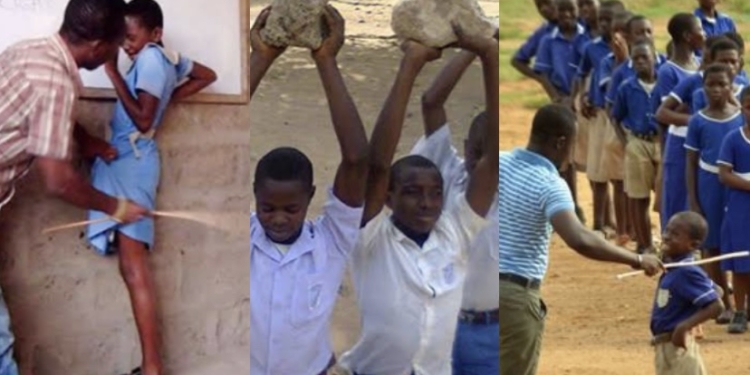“The dustbin was bought with the students’ money.” This seemingly harmless remark tragically cost the life of Monday Ariyo, an SS2 student at Obada Grammar School, Obada, Idi-Emi, Ogun State. The statement came after a teacher brought a trash can to the classroom and instructed the students not to damage it.
Ariyo, who later broke the trash can, triggered a harsh retaliation from the teacher. The teacher flogged him 24 times and ordered him to perform 162 frog jumps. He collapsed during the punishment and tragically took his last breath while being rushed to multiple hospitals. Reports indicated that he allegedly died from complications arising from the punishment.
Ariyo’s story stands as a haunting reminder of how a teacher’s whip, intended to discipline, can devastatingly end a young life. His name joins the growing list of students whose futures were cruelly cut short by misguided and excessive punishment.
In May 2022, 12-year-old Emmanuel Amidu suffered a similar fate. The Junior Secondary School 2 pupil at Simple Faith Schools, Agbara, Lagos State, died at the Lagos University Teaching Hospital, Surulere, after being flogged by his mathematics teacher. Emmanuel began vomiting in the classroom shortly after the beating and was rushed to the hospital, where he later passed away.
In a more extreme case, in 2020, Boluwatife Omelaja, a student at Elihans College, Ikorodu, Lagos State, met a tragic end. His teacher, Emmanuel, reportedly beat him to death over his inability to answer a classroom question correctly.
Yet, corporal punishment continues to be a common culture in Nigeria. In 2022, UNICEF estimated that 85% of Nigerian children under the age of 14 experienced beatings at school, with nearly one in three children experiencing severe physical punishment.
Similarly, a World Health Organisation (WHO) global report revealed that in some countries, almost all students report being physically punished by school staff.
According to Saadhna Panday-Soobrayan, UNICEF’s chief of education, “Much of this violent discipline takes place in the very institutions that are entrusted to keep children safe.”
Implications of corporal punishment on students
Research shows that corporal punishment is linked to a range of negative outcomes for children across countries and cultures, including physical and mental ill health, impaired cognitive and socio-emotional development, poor educational outcomes, and increased aggression and perpetration of violence.
“All corporal punishment, however mild or light, carries an inbuilt risk of escalation,” a part of the report reads.
This view aligns with that of Blessing Ahmodu, an Early Years Educator and Curriculum Coordinator, who shared that corporal punishment teaches students that violent reaction is an acceptable form of discipline, leading to the rise of bullying and aggression in schools.
Drawing from her experience, Blessing said that she was beaten in school as a child by a senior student who was encouraged by a teacher, which made her resent both the teacher and the subject they taught.
“This situation became a norm, where any mistake would result in the senior being called to punish me. It made me resent my teacher and the subject, and I developed a stubborn attitude,” she said.
Phillips Blessing, a secondary school teacher, also believes that beating students makes them feel less important, ultimately affecting their academics. According to her, students who face corporal punishment become less receptive to learning or correction.
A mental health advocate, Favour Emezana, weighed in on the psychological impact of corporal punishments on students. She told Within Nigeria that minors who suffered corporal punishment could develop low self-esteem.
“Children who are repeatedly punished this way may struggle to trust adults or believe in their abilities, which can have a long-term impact on their sense of self-worth,” she said.
Emphasising further, Favour said the scars left by corporal punishment aren’t just physical but also emotional, adding that many children carry the weight of these experiences into adulthood, with some struggling with confidence and difficulty building healthy relationships. She further explained that students might also end up associating fear with learning.
Curbing the trend of corporal punishment in Nigeria
Favour advised that parents collaborate with other guardians to advocate for school reform and encouraged them to adopt positive discipline methods. She also noted signs that could signal to parents that their children might be victims of corporal punishment.
“Changes in behaviour, mood, or even a reluctance to go to school can be indicators that something is wrong. Once you have the details from your child, approach the school calmly but firmly. Speak with teachers or administrators to understand their side and advocate for non-violent ways to handle discipline. No child should have to endure physical punishment to learn a lesson,” Favour said.
However, the educationalist Blessing recommended that teachers be properly trained to understand the psychological and physical harm caused by whipping and learn non-violent methods of discipline.
Offering alternative measures for correcting students, she said teachers should address student misbehaviour by considering individual needs and collaborating with parents to find constructive solutions.
“This approach is effective across all age groups, particularly with secondary school students, who often fear specific consequences like parental involvement or public accountability,” she noted.
Blessing added that students who face corporal punishment from teachers should be protected, adding, “Their rights are being violated, and we need to make sure there’s a system in place where they can speak up without fear of being punished for speaking out.”
What the law says about corporal punishment in Nigeria
Enacted in 2003, the Child Rights Act is Nigeria’s most comprehensive law on children’s rights. It guarantees the rights of all children and explicitly prohibits corporal punishment. Additionally, the Violence Against Persons Prohibition Act (VAPP ACT), enacted in 2015, ensures the protection of citizens, including children, from all forms of violence in Nigeria.
Human rights activist Gladys Emmanuel further noted that the United Nations Convention on the Rights of the Child (UNCRC), which Nigeria ratified in 1991, provides an international standard for child protection. She explained that Article 28(2) of the Convention stipulates that school discipline must be administered in a manner consistent with the child’s human dignity.
However, legal practitioner Sandra Ezoke noted challenges in adopting the Child Rights Act to protect students from corporal punishment.
“Section 221(1)(b) of the Act specifically speaks about this issue, but there is a lack of political will to implement it fully,” said Sandra.
Gladys added that despite the strong legal framework provided by the Child Rights Act (CRA) and the UNCRC, several limitations hinder their effective implementation and enforcement in Nigeria. Cultural and religious beliefs remain significant barriers, as many communities regard corporal punishment as a legitimate form of discipline within families and schools.
“These deeply rooted norms often conflict with the principles of the CRA and the UNCRC, making it challenging to enforce the laws effectively.”
Gladys highlights that many parents seeking justice for their children face difficulty accessing affordable legal services, legal aid, and child-friendly complaint mechanisms. These barriers prevent many cases of corporal punishment from being addressed.
In addition, she points out that “enforcement and accountability mechanisms are often inadequate. Corruption, poor training of law enforcement officials, and the perception of corporal punishment as a ‘family matter’ lead to inaction by authorities, school administrators, and community leaders.
“Furthermore, the lack of Family Courts in many states compounds the problem. While the CRA mandates the establishment of such courts to handle child-related cases, their absence means children cannot access justice through child-friendly procedures.”
A ray of hope
Gladys explained that despite the challenges, parents whose children have faced corporal punishment in schools can still seek legal redress. She noted that parents can report the case to law enforcement (e.g., NAPTIP or the Police), engage a lawyer, or report to the State Ministry of Women Affairs.
According to her, in communities with active community-based child protection committees (CPCs), parents can report the abuse to these local bodies, which often have direct connections with local authorities and child protection agencies.
Gladys further explained that parents can report violations through available child protection hotlines, such as the UNICEF-supported Child Helpline or the NAPTIP hotline 627.
“These hotlines provide access to child protection services and rapid response from authorities,” she added.




Discussion about this post